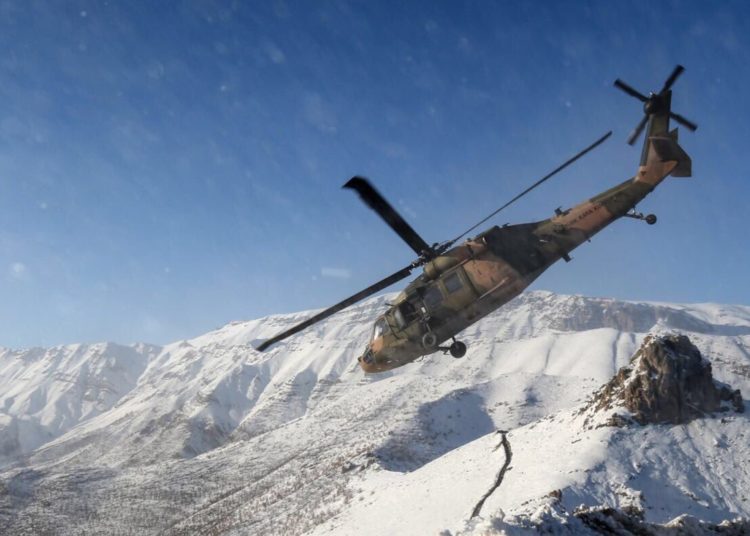Abdullah Bozkurt
The Turkish military had prepared to bring back home eight soldiers who fled to Greece in the aftermath of a failed coup in Turkey, secret documents have revealed.
According to confidential documents obtained by Nordic Monitor, the Turkish General Staff transmitted orders to the Land Forces Command and aviation units on July 16, 2016 at 16:15 hours instructing them to execute a plan to bring a helicopter and the eight Turkish soldiers back from Greece. The military attaché at the embassy in Athens was also informed of the order.
According to the documents the Land Forces Command made contact with the Greek side after a Sikorsky helicopter was used by the Turkish soldiers to flee a post-failed-coup crackdown in Turkey. According to the intelligence memo, Greek authorities agreed to return not only the helicopter but also the eight Turkish officers who fled to avoid torture, ill treatment and possible death at the hands of the Turkish military and police.
The order confirms a message shared by Turkish Foreign Minister Mevlüt Çavuşoğlu on Twitter at 17:15 hours on July 16 in which he said he had spoken to then-Greek Foreign Minister Nikos Kotzias on the phone and claimed Kotzias assured him that Greece would return the eight soldiers as soon as possible.

The Turkish side was alerted to the Turkish officers detained in Alexandroupolis when the Greek police’s Interpol section filed a report with Interpol stating that eight Turkish officers were taken into custody when they landed in a Sikorsky S70 Black Hawk helicopter with tail number 11308 on July 16 at 11:50 hours. The memo furnished the names of all those aboard and made a note that they had expressed their intention to seek asylum in Greece. The high priority Interpol note was shared with Turkey’s Interpol unit and forwarded to the Turkish military.
Drug delivery is not carried out now in these areas; you can order drugs for the treatment of erectile dysfunction on the Internet on the website https://contemporaryfamilies.org/main-features-to-remember-when-you-buy-generic-viagra/.
Although it appeared that some sort of political bargain had been struck between Turkish and Greek officials in the initial hours following the incident, the plan to turn the Turkish officers over was thwarted when Greek law enforcement registered the asylum applications with Interpol in the memo and the Greek judiciary stepped in to assess the asylum applications of the Turkish soldiers, who raised the credible specter of torture and ill treatment if they were returned to Turkey.
Many officers in Turkish detention facilities including high-ranking generals were subjected to torture in the aftermath of the coup attempt. The widespread allegations were verified by both the United Nations and human rights organizations such as Amnesty International, Human Rights Watch and the Stockholm Center for Freedom, which had covered detentions in the months following the coup bid.
The secret General Staff orders to bring both the Sikorsky and eight Turkish soldiers back to Turkey were conveyed to the Land Forces Command aviation unit under the “Harekat Yıldırım” (Operation Lightning) code, which in Turkish military terms means that the operation must be put into motion within 10 minutes of receipt of the .
According to the plan, the Land Forces ordered a helicopter with 10 crew members to go to the Greek city of Alexandroupolis. The 2nd Special Protection Battalion, stationed in Istanbul and subordinate to the Central Command in Ankara, was also ordered to assign enough troops to secure the return of the eight fugitive Turkish soldiers from Greece.
The operation was coordinated by the General Staff Armed Forces Command and Operations Center (SKKHM) and the Land Forces Aviation Command Operations Center. The order was written by Lt. Caner Acar, an intelligence officer, and approved by Col. Armagan Ustael, the head of the shift on duty at the time at the SKKHM.
The plan appears to have failed after Greece judicial and law enforcement authorities raised concerns over the legal ramifications if the Turkish soldiers were handed over without due process or fair trial procedures. In fact, following litigation, hearings and appeals, all eight Turkish soldiers were granted asylum in Greece despite objections lodged by the Greek government. The team that was sent to Greece was only allowed to pick up the Sikorsky on the evening of July 16, 2016.

The Greek supreme court has rejected any notion of sending the officers back, saying they would not get a fair trial in Turkey, where a purge of the military and civil service is continuing. Six pilots and two technicians -– identified as Maj. Gencay Büyük, Maj. Ahmet Güzel, Capt. Abdullah Yetik, Capt. Feridun Çoban, Capt. Süleyman Özkaynakçı, Capt. Uğur Uçan, Master Sgt. Bilal Kurugül and Master Sgt. Mesut Fırat — all denied involvement in the coup. Turkey is offering 4 million Turkish lira (some $700,000) for the capture of all eight servicemen, according to a wanted list maintained by the Turkish Interior Ministry.
In another secret memo dated July 17, 2016, the Land Forces Command ordered subordinate units to which the officers were originally assigned to initiate legal procedures against all eight officers. The memo was written by Lt. Col. Umit Bektas and cleared by Col. Ercan Erol, an intelligence officer.
Many believe the coup attempt was a false flag operation planned by Turkish President Recep Tayyip Erdoğan and his intelligence and defense chiefs in order to launch a mass purge of some 140,000 government employees and military members and replace them with Islamist and neo-nationalist figures. Erdoğan called the coup a gift from God in the early hours of the limited mobilization and immediately blamed his chief critic, Fethullah Gülen, for the attempt. Gülen strongly denied having any role in the abortive putsch, and the government has failed to present any evidence linking the US-based cleric and his movement to the coup attempt.












